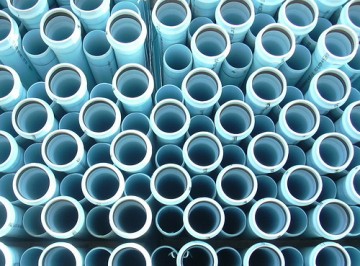Ticking Time Bomb: Cost to Upgrade Worcester’s Water Mains in the Hundreds of Millions
Monday, November 19, 2012

Worcester's water system consists of over 592 miles of water mains ranging in size from 3/4 to 54-inch diameter pipes, as well as 6,100 fire hydrants and nearly 40,000 service connections.
Replacing those mains, along with the streets that run above them, can run in the neighborhood of $2.2 million per mile. Were Worcester to replace all 592 miles of its mains, the cost would be in excess of $1 billion.
A "Constantly Cyclical Process"
However, replacing an entire city's worth of water mains at one time is neither practical nor possible, and Worcester has made an effort to do the work a little at a time each year.
"We have a fairy comprehensive capital program for water," said DPW-P assistant commissioner for operations Matthew Labovites.
Roughly $7.5 million has been set aside in this year's budget for capital projects, which covers everything from relining pipelines to valve work to reservoir work and rehabilitation.
"The issue has come up in years past," said City Councilor Konnie Lukes. "The Public Works Department has had an agenda for repairing those old water pipes. You're always going to see transfers on the agenda to DPW for sewer and water improvements."
"You just can't fix it all at once," Lukes added.
"We've been aggressively relining and replacing water mains for 30 years now," Labovites said. "It's a constantly cyclical process."
Finding the Funds
As an enterprise operation, the Water/Sewer Operations division is funded by ratepayers in Worcester and the surrounding towns that purchase water from the City. Officials must balance proactive and preventative improvements to Worcester's water system with keeping rates affordable for the City's customers.
Earlier this week, City Councilor Kate Toomey remarked that it would be helpful if the City were able to find some federal money or state grant money so that the burden of the improvements would not fall entirely on the shoulders of Worcester's ratepayers.
"It's an older city and so this has to be a constant focus," she said.
"It would be great to be able to do everything at once, but we're trying to tackle as much as we can."
Labovites said the Water/Sewer Operations division does avail itself of federal grants for projects such as alternative energy and watershed land acquisition, which can enable the department to redirect some of its own funds to capital improvements.
"It's not as if there's a lot of free money out there for nuts and bolts water main replacement," he said.
The Massachusetts Water Pollution Abatement Trust, a collaborative effort between the Office of the State Treasurer, the Executive Office for Administration and Finance, and the Massachusetts Department of Environmental Protection, administers a Clean Water and Drinking Water State Revolving Fund (SRF), which has used almost $2 billion in federal grants and state matching funds to help fund $5.7 billion in clean water and drinking water construction projects throughout the Commonwealth since its inception in 1989.

Work in the Pipeline

A valve evaluation program was already scheduled to be done prior to Monday's break, which revealed two inoperable valves near the broken main at Chandler and May Streets. Officials were forced to shut down the entire city's water due to the location of the break and the valves that they were unable to close.
Labovites said DPW-P is also bolstering its hydrant replacement and maintenance program. And, of course, actively replacing and relining water mains.
The 30-inch main that broke on Monday remained a bit of an anomaly on Friday. The main was installed in 1932, and Labovites said such piping will typically last over 100 years if it is cleaned and relined. The main at Chandler and May Streets was relined in the 1980s.
A failure analysis will be performed on the ruptured pipeline to see if officials can determine the cause of the break through metallurgic means.
"We're doing a lot of post-event analysis ourselves to see what we did right and what we can improve on," Labovites said. "We're by and large very pleased with how things went and how folks reacted."
Related Articles
- Local Infrastructure Under Pressure of Growing Population
- NEW: Worcester Shuts Off Water for Entire City After Water Main Break
- NEW: Worcester Boil Water Advisory Still In Effect on Wednesday
- NEW: Worcester Boil Water Order In Effect Until Further Notice
- NEW: Worcester Water Expected Back on by 8AM
- NEW: Worcester Boil Water Advisory Lifted
- NEW: Leicester Water District Gets Relief for $1.7 Million Payments
- Water Main Break Reveals Worcester’s Crumbling Infrastructure




Follow us on Pinterest Google + Facebook Twitter See It Read It